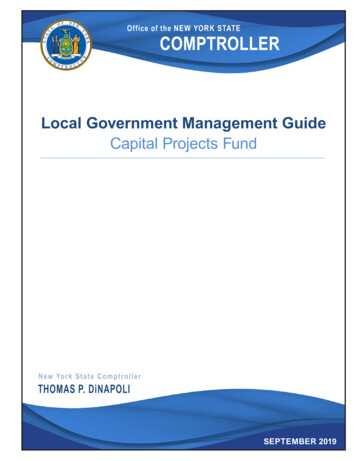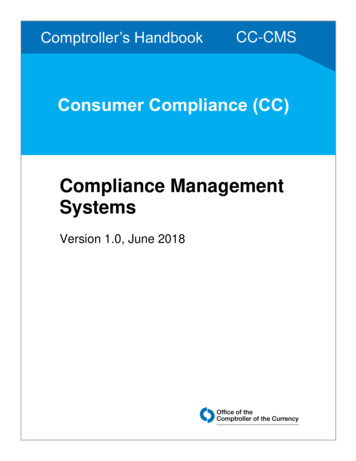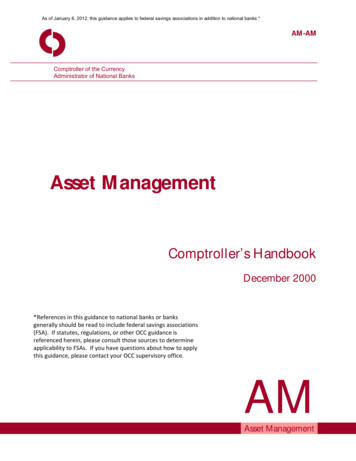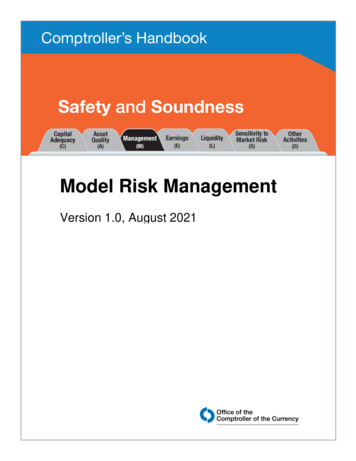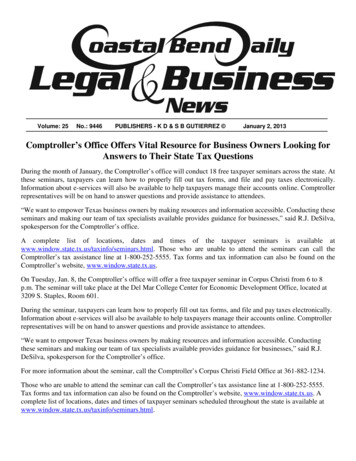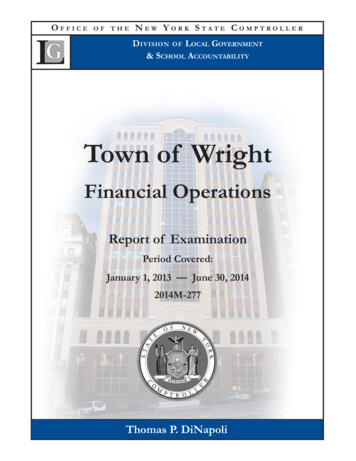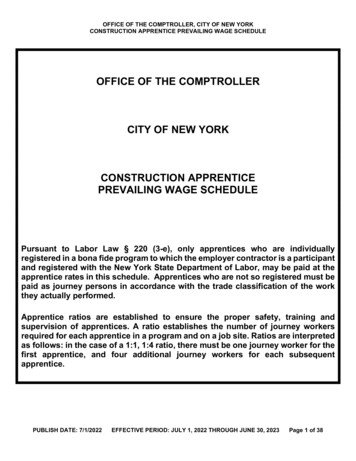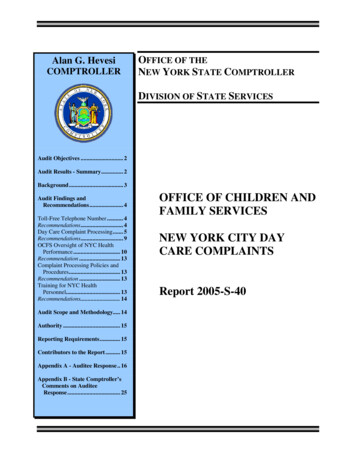
Transcription
Alan G. HevesiCOMPTROLLEROFFICE OF THENEW YORK STATE COMPTROLLERDIVISION OF STATE SERVICESAudit Objectives . 2Audit Results - Summary. 2Background. 3Audit Findings andRecommendations. 4Toll-Free Telephone Number . 4Recommendations. 4Day Care Complaint Processing. 5Recommendations. 9OCFS Oversight of NYC HealthPerformance . 10Recommendation . 13Complaint Processing Policies andProcedures. 13Recommendation . 13Training for NYC HealthPersonnel. 13Recommendations. 14Audit Scope and Methodology. 14Authority . 15Reporting Requirements. 15Contributors to the Report . 15Appendix A - Auditee Response . 16Appendix B - State Comptroller’sComments on AuditeeResponse . 25OFFICE OF CHILDREN ANDFAMILY SERVICESNEW YORK CITY DAYCARE COMPLAINTSReport 2005-S-40
AUDIT OBJECTIVESThe Office of Children and Family Services(OCFS), which oversees day care services inthe State, contracts with the New York CityDepartment of Health and Mental Hygiene(NYC Health) to monitor New York Cityproviders. NYC Health must investigate andresolve complaints alleging providers areviolating health and safety standards stated inthe Social Services Law (Law). The Lawrequires that complaints be investigatedwithin stated timeframes. The Law directsOCFS to establish a toll-free statewidetelephone number to receive inquiries aboutproviders or reports of suspected violations.OCFS relies on its automated Child CareFacility System (CCFS) to monitor NYCHealth’s compliance with the Law and itscontract.For the period January 2004 throughSeptember 2005, our objectives were to assesswhether OCFS verifies that all complaints areproperly classified, promptly recorded, timelyinvestigated and thoroughly resolved, andwhether OCFS oversight confirms NYCHealth complies with the Law and itscontract.AUDIT RESULTS - SUMMARYOur audit found that OCFS needs to improveits monitoring practices to verify that allcomplaints are properly classified, promptlyrecorded, timely investigated and thoroughlyresolved in compliance with the Law and itscontract with NYC Health.OCFS has established a statewide toll-freenumber, but the number is staffed only onweekdays between 9 a.m. and 5 p.m. Parentsusing providers operating after 5 p.m. canleave a message to report a complaint.Although weekend and extended hour daycare is a growing trend, the toll-free number isReport 2005-S-40not staffed, and investigations are notperformed, on weekends and certain holidays;thus a complaint involving imminent dangermay not get investigated the next businessday, as required. Delays in investigatingcomplaints could put children at risk. (Page 4)NYC Health should enter complaints in CCFSimmediately and investigate complaintsaccording to mandated timeframes.Forfounded complaints, NYC Health must timelynotify providers and verify that violations arecorrected. However, our tests showed that 34of the 48 sampled complaints (71 percent)were not entered on CCFS within the requiredtimeframes; 18 of the 48 complaints (31percent) were not classified properly as to theseverity of the complaint; half of our sampledimminentdangercomplaintswereinvestigated late; and most sampled providerslikely received violation letters late. Theseproblems were caused by NYC Health’sinefficient mailing practices, a lack of dataentry review, and inadequate OCFS oversight.NYC Health and OCFS have agreed toaddress these deficiencies to better safeguardchildren’s health and safety. (Pages 4-9)To enhance its oversight of NYC Health’scompliance with the Law, OCFS shouldimprove its performance-based monitoringtools, develop complaint processing policiesand procedures, and verify that investigatorsattend training classes. (Pages 9-13)Our report makes 12 recommendations toimprove complaint processing in New YorkCity. OCFS officials agreed with certain ofour recommendations. They did not agreewith our conclusions and recommendationspertaining to seeking clarifications to theLaw.Page 2 of 26
This report dated December 18, 2006 isavailableonourwebsiteat:www.osc.state.ny.usAdd or update yourmailing list address by contacting us at: (518)474-3271 orOffice of the State ComptrollerDivision of State ServicesState Audit Bureau110 State Street, 11th FloorAlbany, NY 12236BACKGROUNDSection 390 of the Law assigns OCFSresponsibility for overseeing the provision ofmost day care services in the State. Theobjectives of this oversight are to protect thehealth and safety of children cared for by daycare providers by verifying that suchproviders comply with certain minimumstandards (e.g., for safety, sanitation,nutrition, prevention of child abuse andmaltreatment, etc.) established by OCFS’regulations.OCFS’ central office directs day careoversight activities throughout the State,except in New York City. In New York City,OCFS contracts with NYC Health to serve asits agent for monitoring more than 7,100 daycare providers governed by the Law in thefive boroughs of New York City. NYCHealth oversees providers who offerresidence-based day care for children aged 6weeks to 12 years in Family Day Care (3 - 6children) and Group Family Day Care (7 - 12children), and providers who offer facilitybased before and after-school services inSchool-Age Child Care Programs. GroupDay Care Centers, which offer facility-basedcare for more than 7 children under 6 yearsold, are regulated directly by NYC Healthunder Article 47 of the New York City HealthCode.Report 2005-S-40OCFS can make unannounced inspections ofa day care provider at any time to review theprovider’s premises and records forcompliance with the Law and regulations.However, when OCFS receives a complaintalleging a provider is not in compliance, theLaw requires OCFS to inspect the premiseswithin specific timeframes to substantiate thecomplaint and confirm that identifiedproblems are corrected.The Law alsorequires OCFS to establish a toll-freestatewide telephone number to facilitateinquiries about child day care providers andthe reporting of complaints about providerswho may be in violation of OCFS’regulations. OCFS maintains day carecomplaint data on its CCFS system, and usesCCFS to monitor complaint processing.A complaint generally starts with a phone callfrom parents or other members of the publicto the complaint coordinator in NYC Health’scentral office. The coordinator listens to thecomplainant and decides how to classify thecomplaint (imminent danger; serious, a newcategory added in the 2005 contract; or nonemergency) and records the information on acomplaint intake form. After May 2005, thecoordinator entered this information directlyon NYC Health’s Day Care AutomatedTracking System (DCATS). OCFS requiresthat intake data be entered immediately intoCCFS. The intake information is then faxed(intake form) or emailed (DCATS entry) tothe appropriate borough office, where thecomplaint is assigned for investigation.Investigations must be completed withinrequired timeframes, depending on theseverity of the complaint. If a complaint issubstantiated, the provider is notified of thisfinding in writing, and must correct theviolation within 30 days of notification. NYCHealth must follow up to verify that providershave corrected imminent danger and seriousviolations. NYC Health can suspend orPage 3 of 26
revoke the license of providers that do notmake such corrections.For calendar year 2004, OCFS paid NYCHealth about 5.4 million to oversee NewYork City day care providers’ compliancewith the Law and regulations. The 2005contract is scheduled to pay NYC Healthapproximately 9.3 million for these services.The purpose of the additional funding is tohire additional investigators. At NYC Health,134 employees perform contract-relatedservices; 53 of these employees investigateday care complaints. OCFS records indicatethat NYC Health received 927 complaints,114 of which were classified as imminentdanger, between January 1, 2004 and July 14,2005.AUDIT FINDINGS ANDRECOMMENDATIONSToll-Free Telephone NumberThe Law requires OCFS to establish a tollfree statewide telephone number to receiveboth inquiries about child care providers andcomplaints alleging a provider is operating inviolation of the Law or regulations. Thepurpose of the toll-free number is to provideparents and the public with ample opportunityto inquire about day care providers, and toreport potential violations that could endangerchildren’s health and safety. Informationavailable to the public through the toll-freenumber includes child care resource data andthe licensing status of registered day careproviders. The Law requires that OCFSdevelop a process to publicize this number.OCFS does provide a toll-free number; callersconnect to an operator during standardbusiness hours: that is, Monday throughFriday from 9 a.m. to 5 p.m. An answeringmachine takes calls received after 5 p.m. AReport 2005-S-40parent wishing to report a complaint at thistime must leave a message.OCFS officials told us that weekend day careis a growing area of service. However, onweekends and certain holidays, the toll-freenumber is not staffed, and NYC Healthemployees are not available to doinvestigations.The Law requires OCFS or its contractor toinvestigate imminent danger complaints nolater than the next day of operation of theprovider to protect children’s health andsafety. The limited staffing of the toll-freenumber and the lack of investigative staff onweekends and holidays could delayinvestigations of alleged violations that putchildren at risk.As the need for non-traditional child caregrows, an increasing number of providers willbe operating after 5 p.m. and on weekendsand holidays. Therefore, we believe OCFSshould change its staffing of the toll-freenumber, and work with NYC Health to makeinvestigators available on weekends andholidays. OCFS officials indicated they willexamine these issues. Officials report that, asa first step, they have modified CCFS toinclude an indicator for programs that reportthey operate during non-traditional hours.OCFS will determine the prevalence of theseprograms and adjust staffing as needed.Recommendations1. Assess the need to staff the toll-freetelephone number after 5 p.m., and onweekends and holidays.2. Require NYC Health to have staffavailable, possibly on an on-call basis, toconduct investigations on weekends andholidays.Page 4 of 26
Day Care Complaint ProcessingNYC Health should enter complaints in CCFSimmediately upon receipt, as its contractrequires, so OCFS officials have access to upto-date complaint data. As OCFS’ agent inNew York City, NYC Health is required toinvestigate and resolve complaints accordingto the timeframes stated in the Law. Further,NYC Health must determine whether suchcomplaints are founded and, if so, verify thatproviders promptly correct violations.However, we found that:complaintinformation was not entered promptly oraccurately in CCFS; almost one-third of oursampled complaints were investigated late;and most sampled providers likely receivedviolation letters late. We attribute the abovedeficiencies to NYC Health’s inefficient mailroutines and lack of data entry review, and toOCFS’ inadequate oversight of NYC Health’scomplaint processing.NYC Health andOCFS officials have agreed to address theabove issues to improve compliance with theLaw and regulations. Improved compliancemore effectively safeguards the health andsafety of children in day care in New YorkCity.We designed our audit tests to assess whetherNYC Health promptly recorded and properlyclassified complaints on CCFS; timelyinvestigated complaints; and thoroughlyresolved complaints. The test of thoroughresolution included determining whetherproviders were timely notified of theviolation(s) and the required correctiveactions, and whether investigators verified thecorrections required for substantiatedcomplaints.Report 2005-S-40Prompt Entry of Complaint InformationCCFSOCFS officials informed us that NYC Healthis required to enter complaint data in CCFSimmediately upon receipt. OCFS relies onCCFS data to monitor day care complaintprocessing statewide, to assess NYC Health’sperformance of its contract responsibilitiesand to monitor and respond to inquiries aboutindividual providers of day care services.To determine if the data is being entered intoCCFS timely, we reviewed our sample of 50complaints and compared the date on thecomplaint intake form (or in DCATS) to thedate the complaint was entered in CCFS. Ourreview determined that 2 of the 50 complaintswere not entered into CCFS at all. Of theremaining 48 complaints, only 14 complaintswere entered in CCFS on the same day, asrequired; the remaining 34 complaints (71percent) were entered in CCFS late, with theentry time ranging from 1 to 54 business dayslate. Of the 20 imminent danger complaintsin our 2005 sample, only 5 complaints wereentered in CCFS on the same day; theremaining 15 imminent danger complaintstook 6 business days, on average, to beentered in CCFS.Without up-to-datecomplaint data in CCFS, OCFS cannotproperly monitor NYC Health’s compliancewith its contract or with the Law andregulations.Our review of complaint processing foundthat NYC Health staff routinely waited toenter complaints in CCFS until theinvestigation had taken place - sometimesmany days later. Staff would first recordcomplaint data on an intake form or inDCATS, and then fax or email the data to aborough office, where an investigator wouldbe assigned. After the investigation, staffwould enter the complaint data, along withPage 5 of 26
the results of the inspection, in CCFS. Thisentry delay occurred because NYC Health’spolicies and procedures did not requireimmediate entry in CCFS. Since OCFSofficials had not carefully reviewed NYCHealth policies, they did not detect andcorrect this discrepancy.Accurate Complaint Classification inCCFSThe Law states specific timeframes forinvestigating complaints, and the timeframesare driven by the severity of the violation, asassessed by the complaint coordinator.Complaints that indicate a violation that couldput the health and safety of children inimminent danger must be investigated no laterthan the next day of operation of the provider.The 2004 contract stated that all other nonemergency complaints must be investigatedwithin 15 business days. The 2005 contractpurports to recognize a new classification ofcomplaint “serious complaints” and a newtime frame within which these must beinvestigated - five days. We question thelegal basis for this new complaintclassification. The statute establishes twocategories of complaints and prescribescorresponding time frames within which eachtype must be investigated.We do notquestion OCFS’ authority to administrativelyestablish a third category of complaint thatwould accelerate OCFS’ review of thosecomplaints currently in the 15-day category.On the other hand, it is clear that OCFScannot act administratively to lengthen theone day period for review of imminent dangercomplaints. That would require a statutoryamendment. We further believe that theguidance to which OCFS directed usregarding the description of “seriouscomplaints” is nearly indistinguishable fromthat of the imminent danger category. Suchconfusion could result in the inaccurateReport 2005-S-40categorization of a complaint as “serious”when it in fact is an example of an “imminentdanger” complaint, and a correspondingunauthorized extension of time - from one dayto five days - in which to investigate thealleged violation.A complaint’s classification in CCFS must beaccurate for investigation response time to beappropriate and for provider profile data inCCFS to be up-to-date and accurate.When a complaint is received and initiallyclassified as imminent danger, serious or nonemergency, the CCFS entry for the complaintshould list the same classification. NYCHealthrecordedinitialclassificationinformation on complaint intake formsthroughout 2004, but began entering this datadirectly in DCATS beginning May 2005. Todetermine if complaints were accuratelyclassified, we compared CCFS classificationdata to intake forms or DCATS informationfor our 48 sampled complaints (2 of the 50were not entered into CCFS). We found that,for 18 of 48 complaints (37 percent), theclassification in CCFS did not match theoriginal classification assigned to thecomplaint. In each instance, the complaintwas assigned a less severe classification inCCFS than in the source document. Of the 18complaints assigned a lesser severity inCCFS: Sixteenwereimminentdangercomplaints that were reclassified asserious or non-emergency complaints;and Two were serious complaints that werereclassifiedasnon-emergencycomplaints.When informed of this discrepancy, NYCHealth officials stated that staff members mayPage 6 of 26
have improperly changed the classificationbased on their investigation results - a practicethat could easily occur, given that staffregularly waited to enter complaints in CCFSuntil after investigations were completed.NYC Health officials did not detect incorrectclassifications of complaints on CCFSbecause neither supervisors in borough officesnor complaint coordinators in the centraloffice reviewed classification accuracy.OCFS relies heavily on CCFS for monitoringNYC Health’s processing of day carecomplaints. If complaints are incorrectlyclassified on CCFS, OCFS officials do nothave accurate, real-time information about thenumber of specific types of complaints NYCHealthreceives,orNYCHealth’sperformance in responding to suchcomplaints. Further, without accuratecomplaint data, OCFS profiles of individualproviders - and the information available tothe public about such providers - could beunreliable.Complaint Investigation Within RequiredTimeframesThe 2004 and 2005 day care contracts requireNYC Health to investigate day carecomplaints within a set number of businessdays (1 day, 5 days or 15 days), depending onthe complaint’s classification. In reviewingour 50 sampled complaints for compliancewith this requirement, we compared thecomplaint’s date of receipt and classificationon the intake form or the entry on DCATS tothe date on the investigator’s inspectionreport. For the 49 complaints for whichsource documentation was available (oneimminent danger complaint lacked aninspection report), we determined that 16complaints (33 percent) were investigatedlate.Report 2005-S-40As noted in Table 1 on the following page, 11of the 20 (55 percent) imminent dangercomplaints in 2005 were not investigatedwithin the next day of operation, as required.Instead, NYC Health took anywhere from 2business days to 48 business days to performthe investigations. This marks a decline inperformance from 2004, when all imminentdanger complaints were investigated timely.Details of two complaints follow: An imminent danger complaint, in whicha child was reported to have beenspanked by their parent with a belt, wasreceived on March 21, 2005, but notinvestigated until 31 business days later. An imminent danger complaint about apossible illegal provider received onFebruary 18, 2005 was not investigateduntil 48 business days later.Timely Notification of ComplaintInvestigation ResultsAccording to OCFS officials, formalnotification of inspection results should besent to all providers, regardless of the resultsof the investigation. However, when aninspectionsubstantiatestheallegedviolation(s), the Law requires that theprovider be notified of the result, in writing,within 10 days of this finding. The providerhas 30 days from the date it receives thenotice to correct the violation(s). Afterreviewingtheformalnotificationdocumentation related to our 50 sampledcomplaints, and discussing notificationrequirements with NYC Health officials, weconcluded that, due to NYC Health’s mailingpractices, it is very unlikely that any of theproviders who should have received noticesreceived them within ten days.Page 7 of 26
Table 1: Complaints Not Timely vestigations of imminent danger complaints,could needlessly jeopardize the health andsafety of children in day care. NYC Healthofficials acknowledged the noncompliance,but did not explain why it occurred. Weattribute this lack of compliance with the Lawto inadequate monitoring by OCFS. In fact,OCFSmonitoringreportsincorrectlyconcluded that NYC Health was meetingperformance standards. We discuss OCFSmonitoring in the next section of this report.Of the 50 complaints in our sample, 14complaintsweresubstantiatedbyinvestigations. We determined that 12 of the14 notification letters were generated withinthe 10-day timeframe, and that 2 letters weregenerated late.OCFS officials informed us that, since thesetwo cases involved a third party - specifically,Child Protective Services and the New YorkCity Police Department - the contract allowedNYC Health 60 days for third-partyinvestigation and provider notification.The statute is unclear regarding the amount oftime permitted between the inspection of aprovider following a complaint and thedetermination by the agency of whether aviolation has occurred.However, weReport 2005-S-40question the prudence of a contractualprovision allowing for a 60 day time framefor such period, especially given the nature ofthis type of complaint which necessitatesintervention by law enforcement agencies.The statute is silent regarding time betweeninspection and determination; however, itseems to anticipate that the determination willbe made simultaneously with the inspectionor within a short time thereafter, given thecomparatively short time frames provided fornotification of violations and time to cure.We believe that this provision of the statutewarrants further Legislative attention.Although the above 12 letters were producedwithin the 10-day period, it is doubtful thatproviders actually received them on timebecause of NYC Health’s inefficient mailingpractices.We found that t letters (or any correspondence) toproviders directly from their borough offices,because the offices do not have the necessarymailing machines.Instead, the prepared letters must be sent bycourier to NYC Health’s central office, wherethe letters are stamped and sent to theproviders.According to NYC Healthofficials, this process can take up to twoweeks. Therefore, even if the inspectionPage 8 of 26
notifications are prepared on time, it is highlydoubtful that providers would be notifiedwithin the required ten days. Since a providerhas up to 30 days to correct a violation uponnotification, noncompliance with thisrequirement could delay the correction ofidentified health and safety risks.Verification of Corrective ActionsFor substantiated complaints, the complaintinspection notification letter also includes aCorrective Action Plan (Plan) which listsviolations found during the complaintinvestigation, the required corrective actionsand the dates each corrective action must beimplemented. The Law requires that providerscomplete corrective actions within 30 days ofreceipt of the notification letter. However,where the public health or an individual’ssafety or welfare are in imminent danger, alicense or registration may be temporarilysuspended or limited immediately uponwritten notice to the provider prior to ahearing and opportunity for corrective action.OCFS maintains that the language of thisstatute authorized it to establish a shorterperiod within the 30 day framework whereappropriate. OCFS argues that it is desirableto have a period that is shorter than 30 daysfor violations that are more serious but do notwarrant the alternative of suspension orlimitation of license provided in statute. Weagree. As OCFS points out, without theoption of a shorter period for the correction ofmore serious violations, OCFS may have tosuspend licenses and disrupt needed serviceseven where prompt remediation would havebeen adequate. Nevertheless, in order toavoid any potential challenge to its authorityto provide for a shorter period in suchcircumstances, we recommend that OCFSseek legislative clarification of the statute.Report 2005-S-40According to OCFS’ policy, if an imminentdanger or serious complaint is substantiated,NYC Health must directly verify that theprovider implemented the required correctiveactions. In most cases, verification requiresanother site visit, or corroboration ofcorrection by a third party, such as ChildProtective Services. On-site follow-up visitsare not required for non-emergency violationsunless the provider was cited for more thanfive violations during the investigation. Oncethe corrective actions are implemented, thecomplaint is closed out on CCFS.We reviewed the Plans related to the 14substantiated complaints and found that NYCHealth made follow-up visits in each instanceto verify that violations were actuallyimplemented. All the visits were made withina reasonable time of the due date for thecorrective action.Recommendations3. Confirm that NYC Health’s policies arechanged to require the immediate entry ofcomplaint data in CCFS. Review NYCHealth’s policies and procedures on aperiodic basis to confirm that they complywith the Law and contract requirements.4. Require NYC Health to develop a reviewprocess to confirm the accuracy ofcomplaint classification on CCFS.5. Seek the appropriate change to the SocialServices Law or regulations to establish athird category of complaint classificationand the corresponding time frame forinvestigation.Clarify the distinctionbetween an “imminent danger” complaintand a “serious complaint” in thecomplaint classification descriptions.Page 9 of 26
6. Seek the appropriate change to the SocialServices Law to clarify the time allowedbetween an inspection and a determinationof whether a violation has occurred andthe time within which OCFS may requirea provider to complete corrective actions.7. Make certain that complaints areinvestigated within the legally requiredtimeframe.8. Require NYC Health to equip boroughoffices with necessary mailing machinesto expedite the mailing of inspectionnotifications.OCFS Oversight of NYC HealthPerformanceOCFS is responsible for monitoring NYCHealth’s performance in verifying that daycare providers in New York City maintain asafe and secure environment for children intheir care.To monitor NYC Healtheffectively, OCFS must have reliablemonitoring tools to measure the extent towhich NYC Health’s complaint processingcomplies with the Law and regulations. Topromotecompliance,OCFSshouldpromulgate policies and procedures that detailhow complaint processing should beperformed, and require that complaintinvestigation staff receive the trainingrequired by the Law.We found that OCFS developed monitoringtools for use in conjunction with the 2005performance-based Day Care Contract, whichtied payments to NYC Health’s achievementof performance goals. Since these toolsmeasure performance using CCFS data,which we found to be inaccurate andincomplete, the results of this measurementare inherently unreliable. However, we alsoReport 2005-S-40determined that the monitoring toolsthemselves - apart from the data reliabilityproblem - were not effective for accuratelyassessing performance.The reports weexamined omitted investigation timeliness inassessing NYC Health’s performance, and theon-site review process incorrectly “passed”sampled complaint cases for which one ormore critical compliance requirements werenot met. We also found that OCFS trainingpolicies did not clearly require or track theprovision of mandated training forinvestigative personnel. Without nt and policies and procedures thatprovide adequate direction, OCFS cannotdetermine whether NYC Health is complyingwith requirements in the Law and regulationsintended to safeguard children’s health andsafety.Performance-Based Monitoring ToolsOCFS has developed three monitoring toolsto be used in conjunction with the 2005 DayCare Contract: a regional monthly indicatorsreport; a quarterly standard performancereview; and a quarterly on-site case review.The 2005 contract is performance-based, sopayments on the contract are directly relatedto NYC Health’s achievement of timelinessand compliance goals for complaintprocessing. We support the use ofperformance-based contracts and monitoringtools to measure goal achievement. However,we found OCFS’ monitoring tools were notreliable for measuring performance, sincethey omitted certain key indicators orincorrectly “passed” sampled complainttransactions for which critical elements ofcompliance were not met.Page 10 of 26
Regional Indicators ReportEach month, OCFS issues a regional monthlyindicators report, which tracks and comparesday care data in CCFS by region throughoutthe State. The complaint section of the reportfocuses on whether a determination has beenmade on a complaint. A determination is adecision, based on an investigation, that a daycare complaint has been substantiated (and aviolation exists) or unsubstantiated. Onelisted goal is for all complaints to have had adetermination made by the month followingthe complaint’s receipt, and within 60 days ofthe investigation.When we reviewed the July 2005 regionalmonthly indicators report, however, we foundthe report lacks data about investigationtimeliness, based on level of severity - acritical indicator for measuring compliance.This statistic would inform OCFS officialswhether i
old, are regulated directly by NYC Health under Article 47 of the New York City Health Code. OCFS can make unannounced inspections of a day care provider at any time to review the provider’s premises and records for compliance with the Law and regulations. However, when OCFS receives



